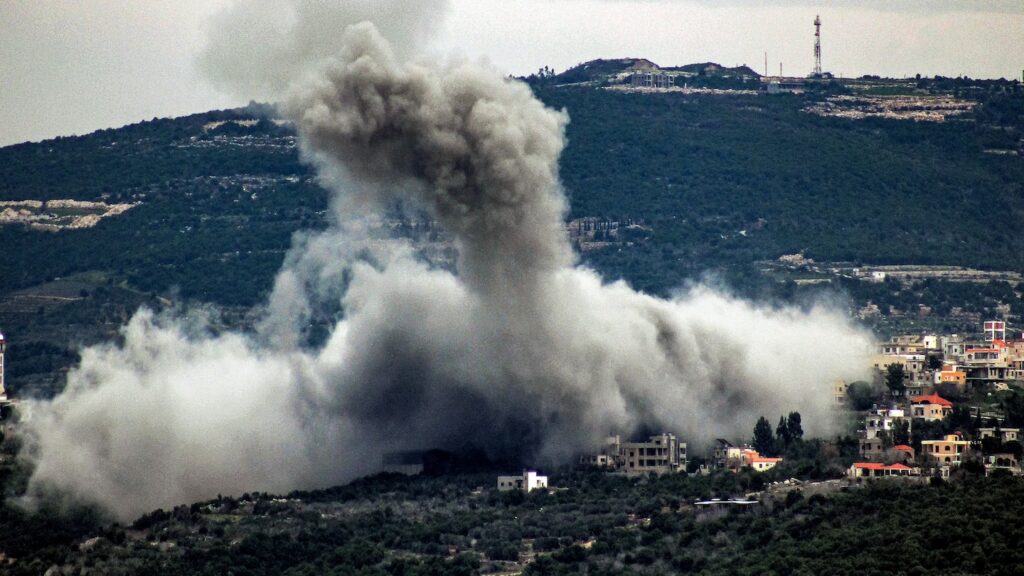Israeli fighter jets are Massive waves of attacks on Lebanese territory” Israeli Maj. Gen. Daniel Hagari announced as the attack was underway, saying more details would be announced later.
The action followed an attack launched in the morning from Lebanon toward the northern Israeli town of Safed, which hit residential buildings and an IDF base. One Israeli woman was killed and at least eight others were injured, said Ilana Stein, a spokeswoman for the National Directorate of Public Diplomacy. She condemned Hezbollah's rocket launches. “This can no longer be our reality,” she said.
Hezbollah, an Iran-aligned militia and Lebanon's most powerful political group, did not immediately claim responsibility.
Since October 7, Hezbollah has joined a string of groups that say they support Hamas by attacking Israel and, in some cases, attacking U.S. interests in the region.
According to Israeli authorities, this was the day Hamas launched a bloody attack on Israel, killing 1,200 people and taking another 253 hostages back to Gaza. Israel responded with a military operation that it says aims to eradicate Hamas and other militants from the enclave. More than 28,000 people died there.
Since October 7, rockets have been flying across the demarcated border area between Lebanon and Israel almost every day. About 170 Hezbollah members were killed, according to a tally based on the group's death announcements.
Lebanese state news agency NNA identified the civilians killed on Wednesday as a Syrian mother, her two-year-old son, and her 13-year-old son-in-law. Their bodies were pulled out from under the rubble of a destroyed house.
Tens of thousands of residents of southern Lebanon and northern Israel have been forced to flee their homes over the past four months, leaving large parts of the region empty. Casualties are mostly limited to combatants. Civilian deaths were rare.
Diplomats from the United States, Britain, France and the European Union rushed to Lebanon to avert an all-out war as fighting raged and strikes reached deep into both countries. Israeli officials have repeatedly warned, both in public statements and privately with allies, that time for diplomacy is running out.
Israel warned Washington in late December that if a long-term border agreement was not reached soon, Israel would escalate its fighting with Hezbollah. Officials familiar with the talks understood at the time that the end of January was a soft deadline for both sides to reach an agreement.
On January 5, Hezbollah leader Hassan Nasrallah first mentioned the possibility of eventually demarcating the border between the two countries. This is a step that the United States, other Western governments, and the United Nations have been advocating for years.
However, Prime Minister Nasrallah has made it clear that there will be no talks until a ceasefire is reached in Gaza.
This week, France submitted a proposal to the Lebanese government highlighting the importance of implementing a UN resolution directing armed personnel, assets and weapons not belonging to the Lebanese government or UN peacekeeping forces to withdraw approximately 40 kilometers from the border.
But a European diplomat, who spoke on condition of anonymity to discuss the delicate situation, said talks on a ceasefire at the border were “the same as before”. Talks are not an impasse, he said, and “there are no talks.” Hezbollah will not participate in talks while the war in Gaza continues.
Prime Minister Nasrallah said on Tuesday that diplomats visiting Lebanon clearly prioritized Israel's security and parroted its demands.
“These delegations… are trying to intimidate,” he said in a televised address. He said a delegation warned last month that Israel would start a war within two days.
“This party of intimidation… will not work,” Nasrallah said. “What would happen if we stopped fighting in the South?” [will happen] To Gaza? ”
But the European diplomat said the language regarding Gaza ceasefire talks was “not good”. He said progress in talks brokered by the Qatari and Egyptian governments has been slowed by disagreements over whether Israel should release Palestinian hostages held in Gaza in exchange.
“There's a name, too. [the Israelis] I don't want to include Marwan Barghouti,” the diplomat said, referring to the Fatah-linked militia leader who is serving five life sentences in Israeli prisons for the murder of five people.
Despite his imprisonment, Barghouti, 64, is one of the most popular Palestinian political leaders, respected and admired throughout the West Bank and Gaza. The European diplomat said members of the international community have convinced Israel that Barghouti is the only alternative to Hamas, as he is seen as part of a “new class that will take over the current class in Palestine.” He says he is trying to convince them that there is.
Wednesday's attack showed that attention is shifting to Lebanon as the war in Gaza slows. It is unclear whether Israel will expand its attacks beyond Hezbollah near the border to other Lebanese targets further north. A jet plane flew low over Beirut on Wednesday, raising fears of an impending attack.
Israeli Minister Benny Gantz threatened such an expansion on Wednesday. “We must be clear that Hezbollah is not the only person responsible for the shootings coming out of Lebanon, but also the Lebanese government and the Lebanese state that allows the shootings to come from its territory,” he said. said.
“There are no targets or military infrastructure in the north of the country that are not within our sight,” he said.
Lior Soroka, Mohamed El Chamma and Susan Haidamas in Tel Aviv contributed to this report.


